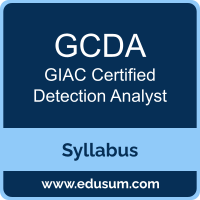 Use this quick start guide to collect all the information about GIAC GCDA Certification exam. This study guide provides a list of objectives and resources that will help you prepare for items on the GIAC Certified Detection Analyst (GCDA) exam. The Sample Questions will help you identify the type and difficulty level of the questions and the Practice Exams will make you familiar with the format and environment of an exam. You should refer this guide carefully before attempting your actual GIAC Certified Detection Analyst (GCDA) certification exam.
Use this quick start guide to collect all the information about GIAC GCDA Certification exam. This study guide provides a list of objectives and resources that will help you prepare for items on the GIAC Certified Detection Analyst (GCDA) exam. The Sample Questions will help you identify the type and difficulty level of the questions and the Practice Exams will make you familiar with the format and environment of an exam. You should refer this guide carefully before attempting your actual GIAC Certified Detection Analyst (GCDA) certification exam.
The GIAC GCDA certification is mainly targeted to those candidates who want to build their career in Cyber Defense domain. The GIAC Certified Detection Analyst (GCDA) exam verifies that the candidate possesses the fundamental knowledge and proven skills in the area of GIAC GCDA.
GIAC GCDA Exam Summary:
| Exam Name | GIAC Certified Detection Analyst (GCDA) |
| Exam Code | GCDA |
| Exam Price | $979 (USD) |
| Duration | 120 mins |
| Number of Questions | 75 |
| Passing Score | 79% |
| Books / Training | SEC555: SIEM with Tactical Analytics |
| Schedule Exam | GIAC |
| Sample Questions | GIAC GCDA Sample Questions |
| Practice Exam | GIAC GCDA Certification Practice Exam |
GIAC GCDA Exam Syllabus Topics:
| Topic | Details |
|---|---|
| Alert Analysis | - The candidate will demonstrate an understanding of how to analyze endpoint security logs, augment intrusion detection alerts, analyze vulnerability information, correlate malware sandbox logs, handle alerts efficiently, identify which alerts to retain and identify staff training opportunities. |
| Device Discovery | - The candidate will demonstrate an understanding of how an environment can be more fully understood through the use of active and passive device discovery and how this understanding can be used to create baselines and detect anomolous behavior. |
| Endpoint Logging Analysis | - The candidate will demonstrate an understanding of how to discover abnormal activity, establish baselines and optimize logging to find anomalous behavior through the use of endpoint logs, events of interest and host-based firewalls. |
| Endpoint Logging Collection | - The candidate will demonstrate an understanding of how to identify attacks and analyze logs in both Windows and Linux environments and employ scripting to reduce log noise as well as establish collection strategies, both agentless and agent-oriented in these environments. |
| Log Aggregation and Parsing | - The candidate will demonstrate an understanding of how log filters and message brokers can be used during data queuing and storage to enhance log retention and search response times, demonstrate an understanding of the methods and techniques used to perform analysis, analytical reporting, and alerting through the use of visualizations and detection dashboards. |
| Log Collection | - The candidate will demonstrate an understanding of how data gathering strategies, event rates, storage requirements and staffing requirements inform SIEM planning and event logging device architecture, log monitoring for assets, data gathering and preservation strategies and techniques of log collection. |
| Log Output and Storage | - The candidate will demonstrate an understanding of data queuing, resiliency and storage as well as how to perform analytical reporting and alerting through the use of visualizations and detection dashboards. |
| Network Service Log Analysis | - The candidate will demonstrate an understanding of how to identify attacker characteristics, determine anomalous behavior and establish baseline behavior in common network protocol traffic such as SMTP, DNS, HTTP and HTTPS. |
| Network Service Log Collection & Enrichment | - The candidate will demonstrate an understanding of detection methods and relevance to log analysis, analyzing common application logs, application of threat intelligence to generic network logs, correlation of network datasets and establishment of network baseline activity. |
| Post-Mortem Analysis | - The candidate will demonstrate an understanding of how to use virtual machines and malware sandboxes, configure systems to generate event log alerts after compromise, identify unusual time-based activity and re-analyze network traffic after an incident. |
| Software Monitoring | - The candidate will demonstrate an understanding of how to identify authorized and unauthorized software, treat scripting tools and command line parameters as a special kind of software and source collection methodology. |
| User Monitoring | - The candidate will demonstrate an understanding of how to utilize behavior analytics when analyzing user logons, built-in accounts and system services based on patterns, use network data to discover unauthorized use or assets, configure enterprise wide baseline collection and establish large scale persistence monitoring. |
To ensure success in GIAC GCDA certification exam, we recommend authorized training course, practice test and hands-on experience to prepare for GIAC Certified Detection Analyst (GCDA) exam.
